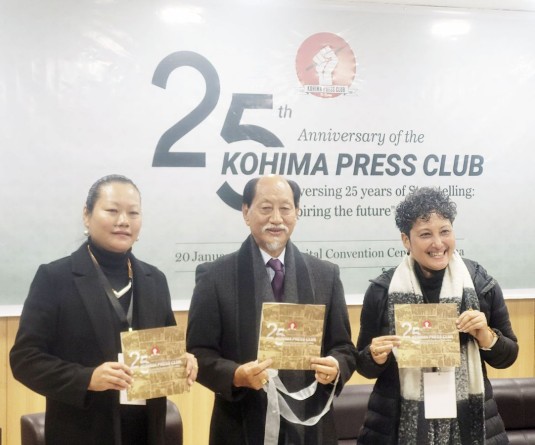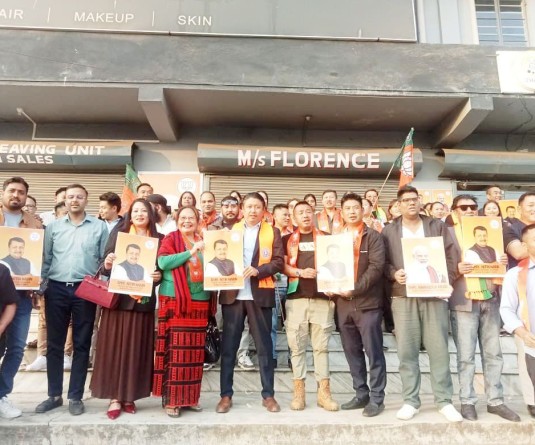
Writes to Law Commission of India for maintaining status quo
Kohima, June 27 (MExN): The Ex-Parliamentarian's Association of Nagaland (Ex-PAN) today urged the Law Commission of India (LCI) to maintain the status regarding the Uniform Civil Code (UCC) and expressed concern that the implementation of the code would create a ‘topsy-turvy' world having significant negative consequences, even the tranquillity of India.
In a representation to the 22nd LCI, the Association noted that it deliberated the UCC during a meeting on June 20 and expressed grave concern that the proposed UCC would have far reaching consequences on the Naga society if implemented.
In this connection, the meeting resolved to submit the representation voicing out strong opposition to the adoption of the UCC in the country, stated the representation signed by Ex-PAN President Joshua Sumi and General Secretary, Tarie Zeliang.
The Association, comprising of all former State Legislators and Members of both upper and lower houses of the Parliament representing Nagaland, pointed out to the LCI that since time immemorial, the people in every Naga village have been governed by laws based on their unique Traditional Customary laws.
This customary legal system of the Nagas have been appreciated and recognised, so much so, that it has been enshrined in the Constitution of India under Article 371 (A), it asserted, with special provisions for safegaruding the religious or social practices, customary law and procedure, administration of civil and criminal justice involving decisions according to Naga customary law and ownership and transfer of land and it resources.
The Ex-PAN also highlighted historical and political background ‘convincing the lawmaker of India’ to create and incorporate the Article 371 (A) in the Constitution of India.
It included the existence of independent village republic among the freedom loving tribal people, enjoinment to Independent India despite protest, violent political movement as well as the passing of the draconian Armed Forces Special Powers Act (AFSPA) 1958 etc.
According to the EX-PAN, the tragedy was contained, to some extent, through the 16 Point Agreement that created the State of Nagaland.
In the Agreement, the law makers of India, particularly in acknowledgement of the extent of human tragedy that had been inflicted upon the Nagas, made many provisions which are held in solemn regard by the people of Nagaland, it added.
One such special provision was Article 371A in part XXI of the Constitution appreciating the unique Customary Law that was practiced by the Nagas to maintain justice and the law and order in society, it said.
The Nagas believe and trust upon this provision and have abided by Agreement that created the State of Nagaland, it added.
If the UCC is implemented, it would be sheer disregard, disrespect and contempt of the solemn agreement that was signed between the Nagas and the Government of India, the Association asserted.
According to the Ex-PAN, the Naga Customary law focuses on and arbitrate on issues that the UCC would principally covers such as individual and community (social) rights and duties, matters of land and property, and covers, marriage and divorce, its related practices and disputes encompassing adoption, inheritance etc.
All these issues have been amply taken care of within the ambit of customary laws that has been practiced over the centuries and based on the wisdom born through the ages, it said, noting that there have been very little dissenting voices in its implementation.
The implementation of the customary laws are very simple and do not entail any cost as there are no judges, lawyers, pleaders, clerks etc, the Association noted, pointing out to ‘Council of Village elders' in each village to deliberate and adjudicate the cases.
In some villages they are referred to and manned by a village Gaon Bora Court, Gaon Bura, literally meaning village elder. At the higher administrative level such as the EAC, SDO circles and the district level, there is a Court of appeal comprising the Dobashi (interpreter/two language) Court that deals with appeal under the customary laws, it said.
The Dobashi is empowered under the provisions of the Rules for administration of Justice and Police in Nagaland, 1933 and the investment of powers and decisions taken thereof have been upheld by the High Court as well as the Supreme Court of India, it added.
The source of powers of the Dobashi Court, thus, emanates not only from the Customary Law but also from Statutory Law and the State Government is further contemplating to establish State level Tribunal for Customary Laws/procedure and usages, the Ex-PAN maintained.
It further highlighted that in Naga society there are no issues such as opposition to remarriages, triple talaq, child marriage etc and while women are excluded from inheritance of clan or community owned lands with a worldview of preventing land and property going out of the Clan or village ownership, Naga society is much more liberal to the idea of sharing family owned land and properties.
In this connection, the Ex-PAN underscored that the Naga society holds a deep attachment and identification with its traditions and customs and entire fabric of their existence revolves around this legal system.
Accordingly, it would be precarious to alienate the people from such a position and impose an alien law that will uproot its mooring, and create a topsy-turvy' world that would have a far reaching adverse consequences affecting even the tranquillity of India, it added.
The application of UCC to the state of Nagaland will contravene/negate the provisions of Article 371(A) and the Naga ways of life, it asserted.
The 21st LCI set for the purpose examining the UCC on August 31, 2018 has also stated that a uniform civic code is "neither necessary nor desirable at this stage" adding that secularism cannot contradict plurality prevalent in the country,” it added.
How have such situational changes taken place in the last five years on the ground to change the learned opinion of the previous Commissions? India thrives on "Unity in Diversity” and the country must protect our differences, the Association stated.
To this end, it urged the LCI to uphold the ruling given by its predecessor and maintain status quo on the issue at hand.





